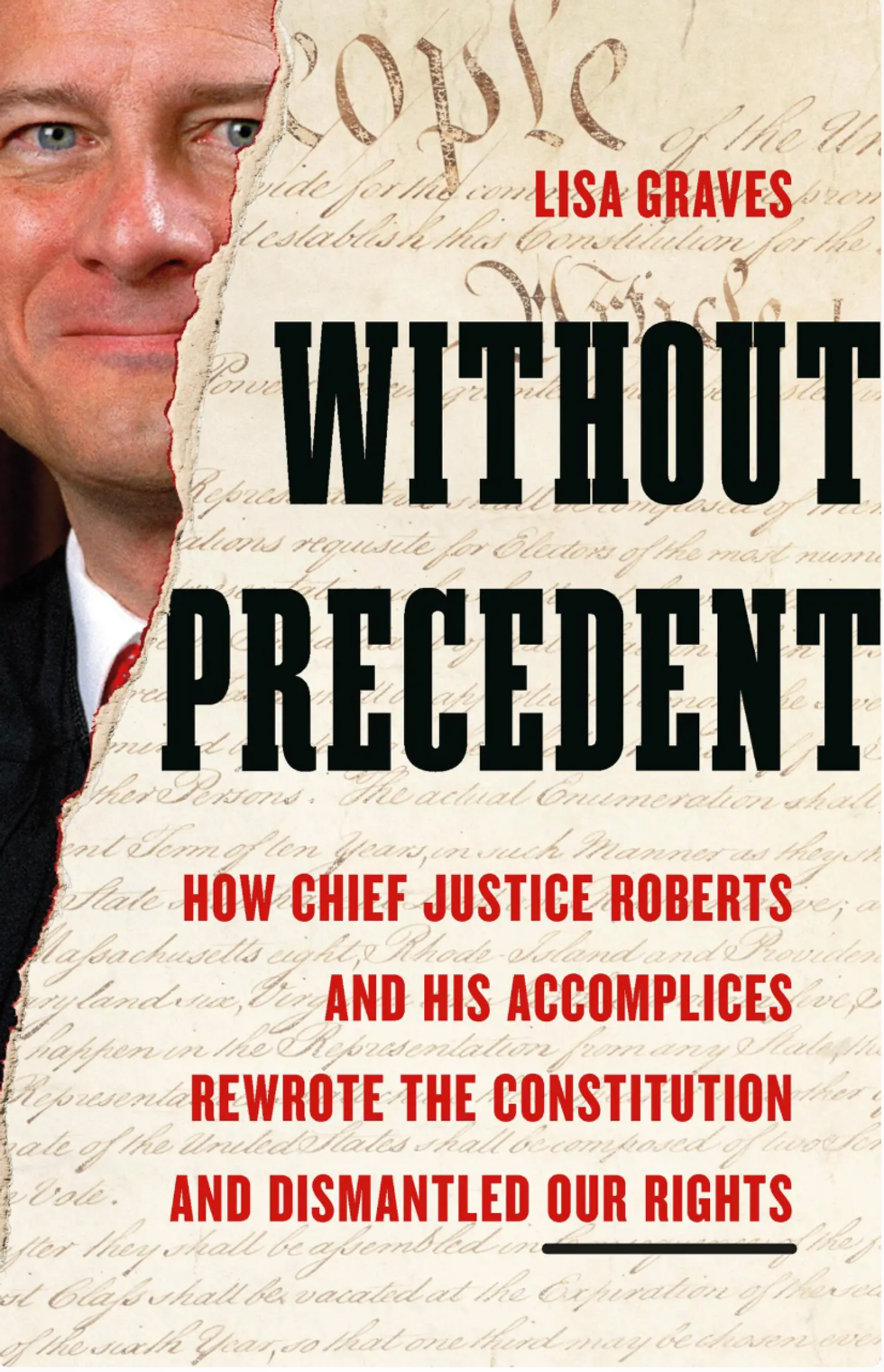
Twenty years ago this week, John Roberts was sworn in as chief justice of the Supreme Court, at 50 years old.
On that day, Lisa Graves “wept.” As chief counsel for nominations with the Senate Judiciary Committee from 2002 to 2005, she anticipated Roberts’ commitment to “advancing a right-wing political agenda through the judiciary,” she writes in her new book: "Without Precedent: How Chief Justice Roberts and His Accomplices Rewrote the Constitution and Dismantled Our Rights."
With President George W. Bush having two Supreme Court vacancies to fill, Roberts was considered a “bankable vote for the Right’s political agenda” and was supported by the Federalist Society’s Leonard Leo, the activist and fundraising impresario now widely considered the architect of the Court’s 6-3 conservative majority, Graves said.
“The Roberts Court I feared would be terribly destructive of Americans' rights, and it's been even more destructive than I feared,” Graves told Raw Story.
From rulings in Citizens United v. Federal Election Commission, which ushered in an era of unfettered dark money influence on elections, to Trump v. United States, which granted President Donald Trump “unprecedented immunity … to act as though he is above the law,” Graves argues Roberts facilitated the politicized state of a court that’s supposed to be impartial, but is now packed with Republican “partisan loyalists.”
“Roberts had conveyed this image that he was going to be a fair umpire as part of his nomination, but he has not been a fair umpire,” said Graves, now executive director of public policy watchdog group True North Research.
"He has put his weight — his fist — on the scale of justice, in favor of Donald Trump.”
‘Arrangement was illegal’
"Without Precedent" reveals how Roberts “sidestepped the ethics code” of the Court before he sat on it, by not recusing himself from a D.C. Circuit Court of Appeals three-judge panel in Hamdan v. Rumsfeld, while interviewing for “the biggest” promotion to the Supreme Court.
The appeals panel overturned a district court, ruling in favor of the Bush administration by determining that the Geneva Conventions did not apply to Salim Ahmed Hamdan, a driver for al-Qaeda leader Osama bin Laden, held at Guantánamo Bay.
Roberts interviewed with Bush the same day the appeals court issued its order. Four days later, Bush announced Roberts’ nomination.
“Three prominent legal ethics professors later concluded that this arrangement was illegal under federal law,” Graves writes.
 Lisa Graves. (provided image)
Lisa Graves. (provided image)
Roberts would recuse himself when the case reached the Supreme Court, which determined that the Bush administration did not have the authority to establish war crimes tribunals, and special military commissions were illegal under the Geneva Conventions and military law.
“His ambition for power I think was key to him deciding to secretly interview with a party to a case before him and not recuse himself,” Graves told Raw Story.
“Had he recused himself, which would have been the right thing to do, he might not have been chosen to be the chief justice or to be nominated to the Supreme Court, and had he ruled against the Bush administration, he might not have been chosen for that position.
“In fact, I think it's fair to say in either scenario, he would not have been chosen.”
‘Corrupted’
Ethical concerns have plagued the Supreme Court in recent years, including revelations that Justices Clarence Thomas and Samuel Alito accepted undisclosed luxury trips and gifts from billionaires, while their wives engaged in political actions related to the attempted overturning of Trump's loss in the 2020 election.
Roberts failed to stand up to Thomas and Alito’s “corruption and bias” and protect the integrity of the Court, Graves writes, by not agreeing to “commonsense and enforceable ethics rules.”
“In my view, the compelling explanation for why the self-described institutionalist facilitated Thomas and Alito’s unethical participation is that Roberts needed their votes to accomplish his agenda of aggrandizing presidential power to try to save Trump — as no one on the Court had dared to do for Richard Nixon — and to expand the power of the Court to have the final say over almost every issue,” Graves writes.
“That’s because Roberts, too, has been corrupted. As the saying goes, ‘A fish rots from the head down.’”
‘Reactionary docket’
The Supreme Court’s docket is “almost entirely discretionary,” and the Roberts-led Supreme Court has created a “reactionary,” case-load, Graves writes.
“The pattern we are seeing of the Roberts Court inserting itself into so many controversies reveals how the Court’s Republican appointees do not want American law — and culture — to remain as is,” Graves writes.
 Without Precedent (provided image).
Without Precedent (provided image).
Last week, Thomas made a rare public appearance at Catholic University's Columbus School of Law in Washington, D.C., to say the Court should take a more critical look at settled precedent.
That’s “unsurprising,” Graves said, given Thomas and his Republican-appointed peers’ voting records in cases such as Dobbs v. Jackson Women's Health, which overturned the right to abortion in Roe v. Wade.
During his confirmation hearing, Roberts was “very clever” in setting the stage for his Court’s pattern of overturning precedents by assuring senators he understood the principle of respecting precedent but discussing leaving room for a decision to be reversed, Graves said.
“I would say Roberts Court is out of control, or maybe drunk with power, because it is arrogantly overturning precedent after precedent in order to allow Trump to behave as no other president has,” Graves told Raw Story.
‘Judicial junta’
The Supreme Court’s new term starts Monday. It is set to hear a slate of cases related to Trump’s policies, from tariffs to transgender rights.
One case set to be heard on Oct. 15 is the Louisiana redistricting case, Callais v. Landry, where Roberts is “poised to constrict” Section 2 of the Voting Rights Act, which he fought against as a young lawyer in the Reagan administration.
Graves reveals how at Roberts’ Supreme Court nomination hearing, Sen. Ted Kennedy (D-MA) was “deeply troubled” by Roberts’ “mean-spirited view,” of Section 2, which allows voters to seek judicial relief in response to a state or local government denying or limiting their right to vote based on race or color.
“Given the the performance of John Roberts and his fellow Republican appointees on the Supreme Court, I don't think any legal precedents are safe from this judicial junta,” Graves said.
But while Graves writes that decisions from the Roberts Court have assaulted workers’ rights, environmental protections, access to healthcare and voting rights, to name a few, she doesn’t want readers to come away “hopeless.”
Rather she hopes readers feel “a moral imperative for us to join together to reform the United States Supreme Court and restore and expand our rights.”
“I hope that they have a greater understanding of how we got into this mess, and the role that John Roberts has played in dismantling our rights and advancing this right-wing billionaire-backed agenda,” Graves said.
“ I hope that they will engage in the vital effort to reform the court and repair the damage that John Roberts and his fellow right-wing appointees have done on the Court.”
- Without Precedent is out now.




